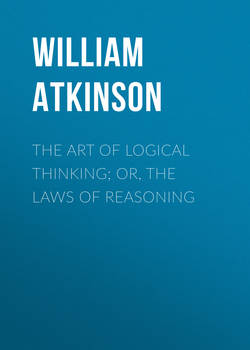The Art of Logical Thinking; Or, The Laws of Reasoning

Реклама. ООО «ЛитРес», ИНН: 7719571260.
Оглавление
Atkinson William Walker. The Art of Logical Thinking; Or, The Laws of Reasoning
CHAPTER I. REASONING
CHAPTER II. THE PROCESS OF REASONING
CHAPTER III. THE CONCEPT
CHAPTER IV. THE USE OF CONCEPTS
CHAPTER V. CONCEPTS AND IMAGES
CHAPTER VI. TERMS
CHAPTER VII. THE MEANING OF TERMS
CHAPTER VIII. JUDGMENTS
CHAPTER IX. PROPOSITIONS
CHAPTER X. IMMEDIATE REASONING
CHAPTER XI. INDUCTIVE REASONING
CHAPTER XII. REASONING BY INDUCTION
CHAPTER XIII. THEORY AND HYPOTHESES
CHAPTER XIV. MAKING AND TESTING HYPOTHESES
CHAPTER XV. DEDUCTIVE REASONING
CHAPTER XVI. THE SYLLOGISM
CHAPTER XVII. VARIETIES OF SYLLOGISMS
CHAPTER XVIII. REASONING BY ANALOGY
CHAPTER XIX. FALLACIES
Отрывок из книги
The processes of Reasoning may be said to comprise four general stages or steps, as follows:
I. Abstraction, by which is meant the process of drawing off and setting aside from an object, person or thing, a quality or attribute, and making of it a distinct object of thought. For instance, if I perceive in a lion the quality of strength, and am able to think of this quality abstractly and independently of the animal – if the term strength has an actual mental meaning to me, independent of the lion – then I have abstracted that quality; the thinking thereof is an act of abstraction; and the thought-idea itself is an abstract idea. Some writers hold that these abstract ideas are realities, and "not mere figments of fancy." As Brooks says: "The rose dies, but my idea of its color and fragrance remains." Other authorities regard Abstraction as but an act of attention concentrated upon but the particular quality to the exclusion of others, and that the abstract idea has no existence apart from the general idea of the object in which it is included. Sir William Hamilton says: "We can rivet our attention on some particular mode of a thing, as its smell, its color, its figure, its size, etc., and abstract it from the others. This may be called Modal Abstraction. The abstraction we have now been considering is performed on individual objects, and is consequently particular. There is nothing necessarily connected with generalization in abstraction; generalization is indeed dependent on abstraction, which it supposes; but abstraction does not involve generalization."
.....
There are two great classes of Reasoning; viz., (1) Inductive Reasoning, or the inference of general truths from particular truths; and (2) Deductive Reasoning, or the inference of particular truths from general truths.
Inductive Reasoning proceeds by discovering a general truth from particular truths. For instance, from the particular truths that individual men die we discover the general truth that "All men must die;" or from observing that in all observed instances ice melts at a certain temperature, we may infer that "All ice melts at a certain temperature." Inductive Reasoning proceeds from the known to the unknown. It is essentially a synthetic process. It seeks to discover general laws from particular facts.
.....